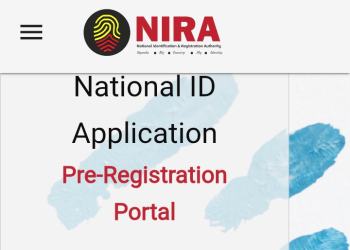
KAMPALA, Uganda— Uganda’s National Identification and Registration Authority (NIRA) registered more than 100,000 people on the first day of its nationwide mass enrollment and national identity card renewal drive, the agency announced Tuesday.
NIRA Executive Director Rosemary Kisembo said the launch proceeded smoothly, despite some internet-related delays in certain areas.
“We had over 100,000 pre-registrations by 3:30 p.m. The process has gone well, though some people experienced delays due to slow internet. Pre-registration depends entirely on internet performance,” Kisembo explained.
Kisembo encouraged urban residents to utilize the online pre-registration system to expedite the process, allowing them to complete personal information at home before visiting a registration center solely for biometric data capture. For ID renewals, applicants only need their name, national identification number (NIN), and expiry date.
New cards are expected to be ready within four weeks, with processing time anticipated to improve as the exercise continues.
NIRA will begin processing changes and corrections of personal details, and issuing first-time IDs to 16-year-olds who already possess a NIN but have never received a card, starting June 16. This two-month phase will be followed by birth, death, and alien registration services.
The mass registration will take place across all 10,594 parishes nationwide using a rotational system. The drive aims to reach over 33 million Ugandans, including 15.8 million whose IDs expire this June and another 17.2 million who have never been registered. Each parish will have at least 10 biometric kits, with more allocated to densely populated areas.
The upgraded IDs will feature four advanced security components to combat forgery and enhance data protection, including a multiple laser image, a machine-readable zone, a quick response code for encrypted data access, and a 2D barcode for fast verification. These cards will support various services, including online and offline verification, digital signatures, e-government access, and mobile ID capabilities, Kisembo said.
Citizens can register or renew their IDs at their place of residence, birthplace, or previous registration location. NIRA has recruited 13,864 personnel and procured 5,666 biometric kits for the initiative. The project has received 183 billion shillings for printing 24 million IDs, 293 billion shillings for systems and data center infrastructure, and 109 billion shillings for temporary staff.
In Namayingo district, the exercise was launched at the district headquarters by local leaders and the security committee, led by resident district commissioner Eva Kwesiga. District chairperson Ronald Sanya praised the government for rolling out the service, noting that many residents held expired IDs crucial for accessing essential services.
“I encourage every resident to actively participate in this free exercise. Religious beliefs should not be a barrier — everyone deserves to be identified,” Sanya said.
Kwesiga emphasized the importance of the National ID as a requirement for accessing key government programs like the Parish Development Model.
Esther Nerima, a resident of Buhemba sub-county, expressed relief and gratitude upon learning that ID renewal was free. “My ID expired last year and I feared I would be asked to pay for a new one,” she said.




















